
Chinese checkers (US) or Chinese chequers (UK) is a strategy board game of German origin that can be played by two, three, four, or six people, playing individually or with partners. The game is a modern and simplified variation of the game Halma.

Reversi is a strategy board game for two players, played on an 8×8 uncheckered board. It was invented in 1883. Othello, a variant with a fixed initial setup of the board, was patented in 1971.
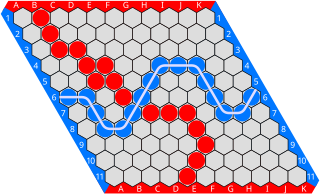
Hex is a two player abstract strategy board game in which players attempt to connect opposite sides of a rhombus-shaped board made of hexagonal cells. Hex was invented by mathematician and poet Piet Hein in 1942 and later rediscovered and popularized by John Nash.
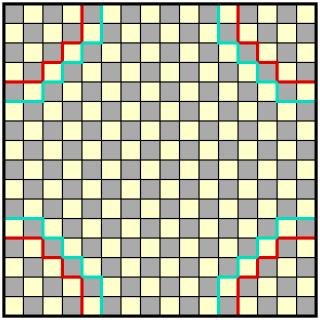
Halma is a strategy board game invented in 1883 or 1884 by George Howard Monks, an American thoracic surgeon at Harvard Medical School. His inspiration was the English game Hoppity which was devised in 1854.
This glossary of chess explains commonly used terms in chess, in alphabetical order. Some of these terms have their own pages, like fork and pin. For a list of unorthodox chess pieces, see Fairy chess piece; for a list of terms specific to chess problems, see Glossary of chess problems; for a list of named opening lines, see List of chess openings; for a list of chess-related games, see List of chess variants; for a list of terms general to board games, see Glossary of board games.

TwixT is a two-player strategy board game, an early entrant in the 1960s 3M bookshelf game series. It became one of the most popular and enduring games in the series. It is a connection game where players alternate turns placing pegs and links on a pegboard in an attempt to link their opposite sides. While TwixT itself is simple, the game also requires strategy, so young children can play it, but it also appeals to adults. The game has been discontinued except in Germany and Japan.

Parcheesi is a brand-name American adaptation of the Indian cross and circle board game Pachisi, published by Selchow & Righter and Winning Moves Games USA.

Sorry! is a board game that is based on the ancient Indian cross and circle game Pachisi. Players move their three or four pieces around the board, attempting to get all of their pieces "home" before any other player. Originally manufactured by W.H. Storey & Co in England and now by Hasbro, Sorry! is marketed for two to four players, ages 6 and up. The game title comes from the many ways in which a player can negate the progress of another, while issuing an apologetic "Sorry!"

Connect Four is a game in which the players choose a color and then take turns dropping colored tokens into a six-row, seven-column vertically suspended grid. The pieces fall straight down, occupying the lowest available space within the column. The objective of the game is to be the first to form a horizontal, vertical, or diagonal line of four of one's own tokens. It is therefore a type of m,n,k-game with restricted piece placement. Connect Four is a solved game. The first player can always win by playing the right moves.
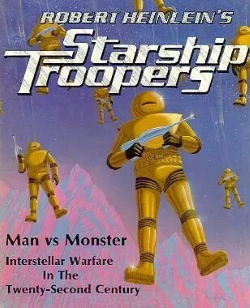
Starship Troopers is a board wargame by Avalon Hill based on the 1959 novel of the same name by Robert A. Heinlein. It was originally released in 1976 and designed by Randall C. Reed. Twenty years later, Avalon Hill redesigned and re-released a "movie" version in 1997 to coincide with the movie's release.
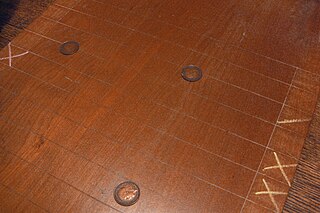
Shove ha'penny, also known in ancestral form as shoffe-grote ['shove-groat' in Modern English], slype groat ['slip groat'], and slide-thrift, is a pub game in the shuffleboard family, played predominantly in the United Kingdom. Two players or teams compete against one another using coins or discs on a tabletop board.

Life and death (死活) is a fundamental concept in the game of Go, where the status of a specific group of stones is determined as either being "alive", where they may remain on the board indefinitely, or "dead", where the group will be "captured" and removed from the board. The basic idea can be summarized by:
A group must have a means to evade capture -- forever -- by having at least two liberties that can't be filled at the same time to sustain itself.
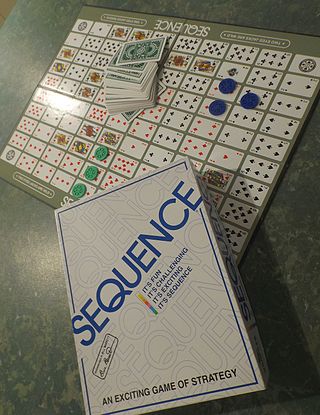
Sequence is an abstract strategy tabletop party game. Sequence was invented by Douglas Reuter and Hamish. They originally called the game Sequence Five. He spent years developing the concept, and, in June 1981, granted Jax Ltd. an exclusive license to manufacture, distribute and sell the board game Sequence and its subsequent variations. The game was first sold in a retail store in 1982. In 2017, Goliath Game Company bought Jax, and in early 2018 also bought all licensor rights and now owns 100% of the game Sequence. Doug Reuter is acknowledged as the inventor of Sequence on all newly produced copies of the game - both on the box and in the printed rules.

Kingmaker is a board game published in the UK by PhilMar Ltd. in 1974 that simulates the political struggles to place a king on the throne of England during the Wars of the Roses. The game was popular, and other editions, including a computerized version, were produced by Avalon Hill, TM Games, and Gibsons Games. The game won a Charles S. Roberts Award in 1976.
Speed is a game for two players of the shedding family of card games, in which players try to get rid of all of their cards first. It is a form of competitive patience similar to Spit.
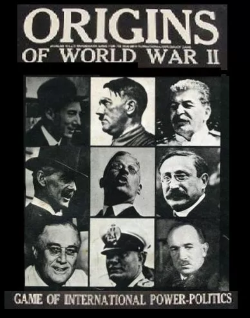
Origins of World War II is a board game published by Avalon Hill in 1971 that combines a wargame with international diplomacy to simulate the diplomatic conditions that led to the outbreak of World War II.

Banqi or Half Chess, also known as Dark Chess (暗棋) or Blind Chess (盲棋), is a two-player Chinese board game played on a 4×8 grid, or half of the xiangqi board. Most games last between ten and twenty minutes, but advanced games can last for an hour or more. Banqi is a social game, usually played for fun rather than serious competition. A more formal version of Banqi may have evolved into the games Jungle and modern Luzhanqi.

Dune is a strategy board game set in Frank Herbert's Dune universe, published by Avalon Hill in 1979. The game was designed by Bill Eberle, Jack Kittredge and Peter Olotka. After many years out of print, the game was reissued by Gale Force Nine in 2019 in advance of the 2021 Dune film adaptation.

Zillions of Games is a commercial general game playing system developed by Jeff Mallett and Mark Lefler in 1998. The game rules are specified with S-expressions, Zillions rule language. It was designed to handle mostly abstract strategy board games or puzzles. After parsing the rules of the game, the system's artificial intelligence can automatically play one or more players. It treats puzzles as solitaire games and its AI can be used to solve them.
The fictional universe of the Discworld novels by Terry Pratchett features a number of invented games, some of which have gone on to spawn real-world variants.



















